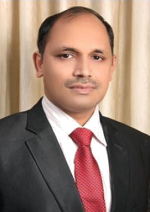Expert Lecture on "UNDERSTANDING OF GENETIC ALGORITHM"
CIS Chapter, IEEE UP Section (CIS11) organized a Lecture Series on "Computational Intelligence". The speaker of the lecture was Dr. Brajesh Varshney, Director, Kanpur Institute of Technology, Kanpur, India.
Date and Time
Location
Hosts
Registration
-
 Add Event to Calendar
Add Event to Calendar
Speakers
 Brajesh Varshney of Kanpur Institute of Technology, Kanpur, India
Brajesh Varshney of Kanpur Institute of Technology, Kanpur, India
UNDERSTANDING OF GENETIC ALGORITHM
Biography:
Prof. Brajesh Varshney completed his B. Sc. (Engineering) Mechanical in 1997 and M.Tech. (Engineering Systems: Mechanical) in 2002 from Faculty of Engineering, Dayalbagh Educational Institute (Deemed University), Dayalbagh, Agra. He obtained first division throughout class 10th to M.Tech. Prof. Varshney has also completed Ph.D. in 2013 from ABV-Indian Institute of Information Technology & Management (Deemed University, Government of India), Gwalior. Currently, Prof. Brajesh Varshney is the Director of Kanpur Institute of Technology, Kanpur, India.
Email:
Address:Kanpur, Uttar Pradesh, India, 208001
Agenda
Abstract of the talk:
Optimization is the process of making something better. Traditional Optimization Algorithms include: Single Variable Optimization Algorithms, Multivariable Optimization Algorithms, Constrained Optimization Algorithms and Specialized Algorithms (Integer Programming, Geometric Programming. Non Traditional Optimization Algorithms include: Genetic Algorithms, Simulated Annealing, Neural Network Based Optimization and Optimization of Fuzzy Systems. Genetic Algorithm (GA) technique is considered very powerful in recent decades to solve optimization problems. GA mimics the concepts of natural genetics and natural selection to constitute search and optimization procedures. GAs are computerized search and optimizations algorithms based on the mechanics of Natural Selection and Natural Genetics. Prof. John Holland and Ann Arbor gave the concept of these Algorithms (Holland, 1975). Prof. Goldberg, Prof. Deb, etc. are pioneer in this field. The most important characteristic of GA: Robustness. Solutions of GAs are very close to the natural formulation. First stage of GA is the generation of population and evaluation of the chromosome (fitness function). There is lot of fitness function available in the literature. In second stage, GA operations are carried out. For this there are three GA operators: Reproduction, Crossover and Mutation.
Reproduction: Good chromosomes from the population are selected and a mating pool is formed. Above average chromosomes are picked from the current population and their multiple copies are inserted in the mating pool. The commonly used reproduction operator is the proportionate reproduction operator where the chromosome is selected for the mating pool with a probability proportional to its fitness. A roulette-wheel strategy is used.
Crossover: New strings are created by exchanging the information among the strings of mating pool. In most cross over operators, two strings are picked from the mating pool at random and some portions of the strings are exchanged between the strings. There is number of cross over operators in GA literature.
Mutation: A crossover operator is mainly responsible for the search of new chromosomes, even though a mutation operator is also used for this purpose. The need for mutation is to create a point in the neighborhood of the current point thereby achieving a local search around the current solution. The mutation is also used to maintain diversity in the population. The random substitution method for mutation operation is used. That is chromosome chosen to mutate is replaced randomly by a new chromosome with certain mutation probability.
These operators will create new population. New population is further evaluated till termination criteria is met (i.e. fitness value is keep on increasing).

